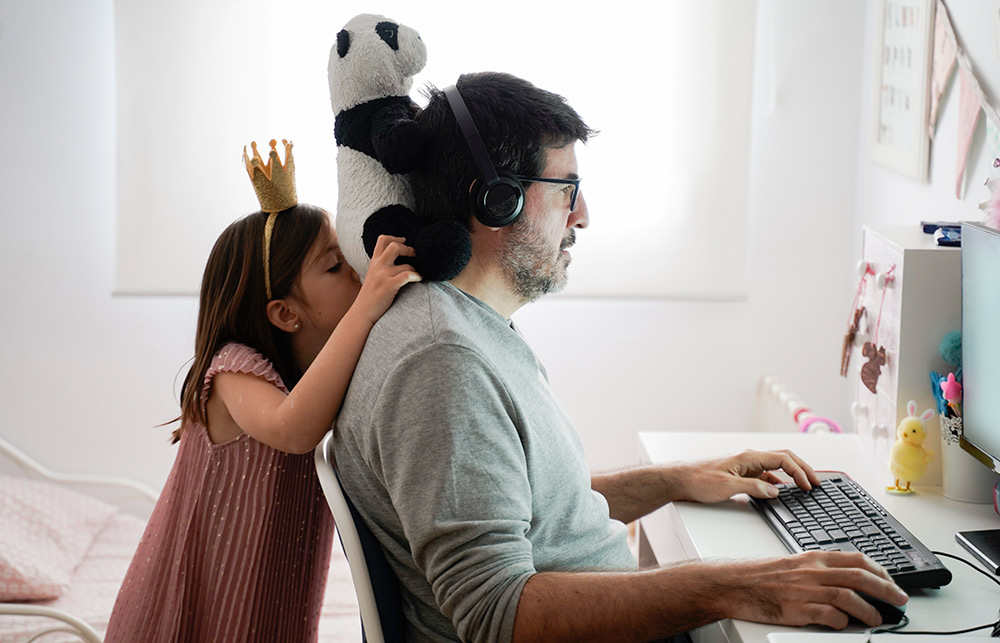
總體而言,,居家辦公趨勢對爸爸們的影響較小。
在家庭和職場中,,男女平等這場戰(zhàn)爭必敗無疑,,最終可能演化成一場殘酷的“先有雞還是先有蛋”的兩難困境。
在疫情爆發(fā)之前,,家庭看護工作絕大部分都落在了女性身上,。大多數(shù)男性表示,他們重視并且希望參與到?jīng)]有任何報酬的家庭看護工作當中,。但左翼智庫新美國基金會(New America)的最新報告顯示,,除了少數(shù)有過相關(guān)經(jīng)歷的男性以外,大部分男性并沒有和配偶平均分擔家庭看護責任,。
新美國美好生活實驗室(Better Life Lab)主任以及該報告的作者布里吉德?舒爾特表示:“男性口頭說家庭看護很重要,,也認為自己同樣應(yīng)該承擔該責任,但他們并未付諸實際行動,?!?/p>
舒爾特認為,男性只有真正經(jīng)歷過家庭看護經(jīng)歷之后,,“他們才會有所改變,,無論他們是主動選擇還是迫于無奈,這都是他們?nèi)松幸欢巫兏镄缘慕?jīng)歷,。所以對于整個社會而言,,我們該如何促成男性從‘心動’(認為家庭看護重要并且自己也應(yīng)該參與其中 )到‘行動’呢?”
新美國美好生活實驗室在2019年調(diào)查了超過2,900名成年人,,當時學(xué)校和日托中心還沒有因為新冠疫情被迫停課,,女性在就業(yè)市場的地位也沒有一朝就退步到三十年前。但該基金的調(diào)查結(jié)果顯示,,相比男性,,女性在經(jīng)濟上受到疫情嚴重影響的諸多原因更加突出。
超過80%的男性和91%的受訪者告訴舒爾特,,他們認為男性和女性應(yīng)該平均分擔家庭看護工作,。但只有46%的受訪者表示,他們是平均分擔這些責任的,;有45%的受訪者表示這些責任主要由女性承擔,,只有4%的受訪者表示男性承擔了主要的家庭看護責任,。
新美國美好生活實驗室針對有過家庭看護經(jīng)驗?zāi)行缘幕卮疬M行了深入分析。這些男性作為父母和“高強度”家庭看護人員,,需要照顧身患疾病或有行為障礙或有其他特殊需求的成年人或兒童,。無論是調(diào)查結(jié)果還是焦點小組采訪都發(fā)現(xiàn),男性提供家庭看護的經(jīng)驗越多,,就越有可能承擔起更多責任,,而且他們會與職場女性一樣面臨許多工作/生活相互沖突的問題。
提供“高強度”家庭看護的男性和女性離開勞動力隊伍的比例相當,,這一點或許最值得注意,。在這個群體中,50%的男性和51%的女性表示,,他們?yōu)榱寺男屑彝タ醋o的義務(wù)離開了勞動力隊伍或者提前退休,。此外,這個群體中,,男性和女性為提供協(xié)助被迫請假(男性64%,,女性71%)和減少工作時間(男性42%,女性45%)的比例同樣接近,。
無論對于男性還是女性而言,,這項調(diào)查的結(jié)果都很難讓人滿意。但這項調(diào)查凸顯出目前女性面臨的就業(yè)危機在很大程度上源于家庭看護危機,,這與我們在新一期《財富》雜志中的觀點相同,,同時這也證明為了給所有看護者創(chuàng)造更好的就業(yè)環(huán)境、必要的帶薪事假,、更多聯(lián)邦兒童看護支持和其他政策干預(yù)是必不可少的。
舒爾特表示:“女性經(jīng)常首當其沖要承擔家庭看護責任,,而且她們的就業(yè)會首先受到?jīng)_擊。但需要提供高強度護理男性同樣面臨巨大壓力,,然而我們的工作場所并未對此做出回應(yīng),。”
她補充說:“如果所有人都希望女性離開職場或者停止工作,,他們是在指望男性繼續(xù)工作,。男性應(yīng)該承擔起養(yǎng)家糊口的全部責任。我們需要制定公共政策,,也需要規(guī)范職場實踐,,為承擔家庭看護責任的所有人提供支持?!?/p>
自2月以來,,有超過540萬女性失業(yè),占疫情期間美國凈失業(yè)人口的一半以上,,另外有近210萬女性徹底退出了勞動力隊伍,。(美國勞工部將在周五發(fā)布1月份的月度就業(yè)報告,我們將在當天更新對女性就業(yè)危機的最新分析,。)
與此同時,,沒有子女或不承擔“高強度”看護責任的男性面臨的工作與家庭義務(wù)之間的沖突要少得多。41%的男性“高強度”看護者對新美國美好生活實驗室表示,,他們不得不將工作延期,因為他們需要拿出更多時間照看家人,,相比之下其他父親的比例為33%,,不承擔家庭看護責任的男性比例只有10%。
舒爾特表示:“對于性別平衡,,我們總是在夸夸其談,,而在實際中,我們并沒有為在職場實現(xiàn)性別平衡做出切實努力,。如果男性‘應(yīng)該’養(yǎng)家糊口,,但他們又要承擔高強度的家庭看護責任,因此不得不縮短工作時間和退出勞動力隊伍,,這一現(xiàn)實矛盾足以證明當前的制度并不合理,。否則,我不知道對此還能有什么更好的解釋,?!保ㄘ敻恢形木W(wǎng))
翻譯:劉進龍
審校:汪皓
總體而言,居家辦公趨勢對爸爸們的影響較小,。
在家庭和職場中,,男女平等這場戰(zhàn)爭必敗無疑,最終可能演化成一場殘酷的“先有雞還是先有蛋“的兩難困境,。
在疫情爆發(fā)之前,,家庭看護工作絕大部分都落在了女性身上,。大多數(shù)男性表示,,他們重視并且希望參與到?jīng)]有任何報酬的家庭看護工作當中,。但左翼智庫新美國基金會(New America)的最新報告顯示,除了少數(shù)有過相關(guān)經(jīng)歷的男性以外,,大部分男性并沒有和配偶平均分擔家庭看護責任,。
新美國美好生活實驗室(Better Life Lab)主任以及該報告的作者布里吉德?舒爾特表示:“男性口頭說家庭看護很重要,,也認為自己同樣應(yīng)該承擔該責任,但他們并未付諸實際行動,?!?/p>
舒爾特認為,男性只有真正經(jīng)歷過家庭看護經(jīng)歷之后,,“他們才會有所改變,,無論他們是主動選擇還是迫于無奈,這都是他們?nèi)松幸欢巫兏镄缘慕?jīng)歷,。所以對于整個社會而言,,我們該如何促成男性從‘心動’(認為家庭看護重要并且自己也應(yīng)該參與其中 )到‘行動’呢?”
新美國美好生活實驗室在2019年調(diào)查了超過2,900名成年人,,當時學(xué)校和日托中心還沒有因為新冠疫情被迫停課,,女性在就業(yè)市場的地位也沒有一朝就退步到三十年前。但該基金的調(diào)查結(jié)果顯示,,相比男性,,女性在經(jīng)濟上受到疫情嚴重影響的諸多原因更加突出。
超過80%的男性和91%的受訪者告訴舒爾特,,他們認為男性和女性應(yīng)該平均分擔家庭看護工作,。但只有46%的受訪者表示,他們是平均分擔這些責任的,;有45%的受訪者表示這些責任主要由女性承擔,,只有4%的受訪者表示男性承擔了主要的家庭看護責任。
新美國美好生活實驗室針對有過家庭看護經(jīng)驗?zāi)行缘幕卮疬M行了深入分析,。這些男性作為父母和“高強度”家庭看護人員,,需要照顧身患疾病或有行為障礙或有其他特殊需求的成年人或兒童。無論是調(diào)查結(jié)果還是焦點小組采訪都發(fā)現(xiàn),,男性提供家庭看護的經(jīng)驗越多,,就越有可能承擔起更多責任,而且他們會與職場女性一樣面臨許多工作/生活相互沖突的問題,。
提供“高強度”家庭看護的男性和女性離開勞動力隊伍的比例相當,,這一點或許最值得注意。在這個群體中,,50%的男性和51%的女性表示,,他們?yōu)榱寺男屑彝タ醋o的義務(wù)離開了勞動力隊伍或者提前退休。此外,,這個群體中,,男性和女性為提供協(xié)助被迫請假(男性64%,女性71%)和減少工作時間(男性42%,女性45%)的比例同樣接近,。
無論對于男性還是女性而言,,這項調(diào)查的結(jié)果都很難讓人滿意。但這項調(diào)查凸顯出目前女性面臨的就業(yè)危機在很大程度上源于家庭看護危機,,這與我們在新一期《財富》雜志中的觀點相同,,同時這也證明為了給所有看護者創(chuàng)造更好的就業(yè)環(huán)境、必要的帶薪事假,、更多聯(lián)邦兒童看護支持和其他政策干預(yù)是必不可少的,。
舒爾特表示:“女性經(jīng)常首當其沖要承擔家庭看護責任,而且她們的就業(yè)會首先受到?jīng)_擊,。但需要提供高強度護理男性同樣面臨巨大壓力,,然而我們的工作場所并未對此做出回應(yīng)?!?/p>
她補充說:“如果所有人都希望女性離開職場或者停止工作,,他們是在指望男性繼續(xù)工作。男性應(yīng)該承擔起養(yǎng)家糊口的全部責任,。我們需要制定公共政策,,也需要規(guī)范職場實踐,,為承擔家庭看護責任的所有人提供支持,。”
自2月以來,,有超過540萬女性失業(yè),,占疫情期間美國凈失業(yè)人口的一半以上,另外有近210萬女性徹底退出了勞動力隊伍,。(美國勞工部將在周五發(fā)布1月份的月度就業(yè)報告,,我們將在當天更新對女性就業(yè)危機的最新分析。)
與此同時,,沒有子女或不承擔“高強度”看護責任的男性面臨的工作與家庭義務(wù)之間的沖突要少得多,。41%的男性“高強度”看護者對新美國美好生活實驗室表示,他們不得不將工作延期,,因為他們需要拿出更多時間照看家人,,相比之下其他父親的比例為33%,不承擔家庭看護責任的男性比例只有10%,。
舒爾特表示:“對于性別平衡,,我們總是在夸夸其談,而在實際中,,我們并沒有為在職場實現(xiàn)性別平衡做出切實努力,。如果男性‘應(yīng)該’養(yǎng)家糊口,但他們又要承擔高強度的家庭看護責任,因此不得不縮短工作時間和退出勞動力隊伍,,這一現(xiàn)實矛盾足以證明當前的制度并不合理,。否則,我不知道對此還能有什么更好的解釋,?!保ㄘ敻恢形木W(wǎng))
翻譯:劉進龍
審校:汪皓
The losing battle for gender equality at home and in the workplace might come down to a brutal chicken-and-egg dilemma.
Most men say they value—and want to participate in—the unpaid caregiving work that women overwhelmingly shouldered even before the pandemic. But the majority of men don’t actually take on an equal share of caregiving responsibilities unless they already have experience doing so, according to a new report from left-leaning think tank New America.
“Men say caregiving is valuable, and they think they should do it equally—but they don’t do it,” says Brigid Schulte, director of New America’s Better Life Lab and the author of the report.
It’s only when men actually get the experience of becoming a caregiver—“whether they choose to, or they have to—that’s what changes them. That’s this transformative experience in their lives,” Schulte says. “So as a society, how do we get men from this abstract notion that care is valuable, and that they should do it, to actually doing it?”
New America surveyed more than 2,900 adults in 2019, before COVID-19 closed schools and day cares and erased three decades of women’s progress in the U.S. workforce. But the organization’s findings highlight many of the reasons why women, and not men, have been so economically devastated by the pandemic.
More than 80% of men, and 91% of all survey respondents, told Schulte that they believe that men and women should equally share in care work. But only 46% of all respondents said that such responsibilities are actually shared evenly, with 45% reporting that they fall primarily on women, and only 4% reporting that they fall primarily on men.
New America dug a little deeper into the responses of men who already have caregiving experience—as parents, and as “high-intensity” caregivers of adults or children with medical or behavioral conditions or other special needs. Both the survey and focus-group interviews found that men with more experience providing care are more likely to take on a larger share of caregiving tasks—and are facing many of the same work/life conflicts that broadly undermine working women.
Perhaps most striking: Men and women who are “high-intensity” caregivers reported leaving the workforce at the same rate. Among that group, 50% of men and 51% of women said they had left the workforce or retired early because of their caregiving obligations. That group of high-intensity caregivers also reported pretty similar rates, regardless of gender, of missing work to provide assistance (64% men vs. 71% women) and of reducing their work hours (42% men vs. 45% women).
These obviously aren’t great outcomes—for men or for women. But they do underline how much the current employment crisis facing women is rooted in a caregiving crisis, as we report in the new issue of Fortune—and how necessary paid family leave, greater federal childcare support, and other policy interventions are to create better employment conditions for all caregivers, regardless of gender.
“Women have always borne the brunt of caregiving responsibilities and of taking the hit at work,” Schulte says. “But men are also under a lot of pressure in these high-intensity caregiving situations—and our workplaces don’t respond.”
“If everybody expects women to drop out or expects women to hold back at work, they expect men to keep working. They’re supposed to be the breadwinners,” she adds. “We need public policies, and we need workplace practices that support all people with caregiving responsibilities.”
More than 5.4 million women’s jobs have disappeared since February—accounting for more than half of all net jobs shed by the U.S. economy over the course of the pandemic—and nearly 2.1 million women have dropped out of the labor force entirely in that time. (We’ll get another update on the unemployment crisis for women on Friday, when the U.S. Labor Department releases its monthly jobs report for January.)
Meanwhile, men who are not parents or who do not have “high-intensity” caregiving responsibilities report much less conflict between their work and home obligations. Among men, 41% of “high-intensity” caregivers told New America they had to put off work because of demands on their time at home, compared with 33% of other fathers and 10% of men who are not already caregivers.
“For all of the lip service that we’ve given to gender equality, we really haven’t done the work that we need to do to make it real in the workplace,” Schulte says. “If men are ‘supposed to’ be breadwinners and providers, but their caregiving responsibilities can be so intense that they’re reducing hours and dropping out of the workforce—you know, if that isn’t a huge sign that the current system isn’t working for anybody, I don’t know what is.”






